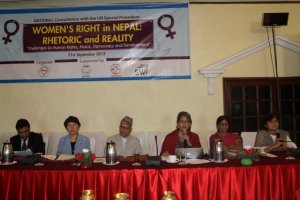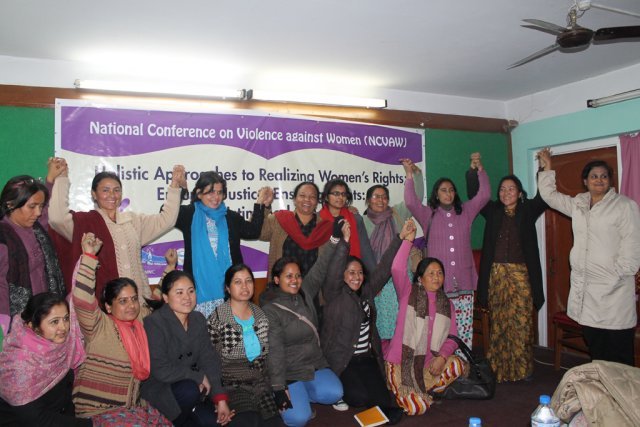WOREC, Nepal: Violence against Women Migrants
Summarised conversation with Renu of WOREC
During the recent GAATW Strategy Meeting Member Organisation WOREC in particular advocated for a need to re-focus issues of trafficking and initiates towards safer migration opportunities for women within the broader structural context of continued violence against women (VAW). We asked Renu (Chairperson National Alliance of Women Human Right Defenders) to share her insights about negotiating safe migration within an environment of violence among returnee migrant women in Nepal.
What is the situation of violence for women living in Nepal and how does WOREC’s work for survivors and Women Human Rights Defenders aim to challenge this situation?
 Violence against women is a pervasive issue for women in Nepal, regardless of their migration status. For example in just one year, between July 2011 and June 2012, WOREC registered 1581 cases of different forms of violence, including a recent case of rape of a returnee migrant woman worker by a police officer and as well as the looting of her money by immigration officers. WOREC has a three-pronged approach to challenge VAW which includes; raising awareness and strengthening solidarity against VAW; creating support mechanisms for survivors such as the seven safe houses it runs; and finally though its advocacy work. WOREC’s advocacy work itself is broad as they engage with the government and provide training to civil servants, work directly with the UN Special Rapporteur on VAW and organise campaigns in collaboration with (WHRDs) networks. WOREC’s work with the National Alliance of Women Human Rights Defenders operates extensively throughout Nepal to support survivors and is itself a highly successful system of organisation.
Violence against women is a pervasive issue for women in Nepal, regardless of their migration status. For example in just one year, between July 2011 and June 2012, WOREC registered 1581 cases of different forms of violence, including a recent case of rape of a returnee migrant woman worker by a police officer and as well as the looting of her money by immigration officers. WOREC has a three-pronged approach to challenge VAW which includes; raising awareness and strengthening solidarity against VAW; creating support mechanisms for survivors such as the seven safe houses it runs; and finally though its advocacy work. WOREC’s advocacy work itself is broad as they engage with the government and provide training to civil servants, work directly with the UN Special Rapporteur on VAW and organise campaigns in collaboration with (WHRDs) networks. WOREC’s work with the National Alliance of Women Human Rights Defenders operates extensively throughout Nepal to support survivors and is itself a highly successful system of organisation.
How do you understand the specific issues of trafficking and migration within a context of violence against women? How does this understanding help frame the types of anti-trafficking and safe migration responses you would like to see?
In my opinion trafficking is a form of violence against migrant women so I personally feel the response against trafficking has to be in terms of direct action in the fight for rights for women overall. Only when women's rights to work and to migrate safely, including access to information, are secured then we can expect to see a decline in women’s experiences of violence in this process all the way from origin to destination.
Can you tell us a bit more about WOREC’s recent National Conference on Violence against Women (NCVAW) entitled; Holistic Approaches to Realizing Women’s Rights Ensuring Justice, Ensuring Rights: From victimhood to agency? What were some of the main issues that arose from this meeting and what strategies have WOREC put into place to succeed in overcoming the challenges faced by women in Nepal?
 WOREC recently organised the National Conference on Violence against Women (NCVAW) entitled; Holistic Approaches to Realizing Women’s Rights Ensuring Justice, Ensuring Rights: From victimhood to agency in collaboration with the Prime Minister’s office, National Women’s Commission and WHRDs from across Nepal. With a commitment to centring the rights of survivors the discussions at the conference raised the need to review existing government policies and framework against VAW, as it was unanimously decided that present frameworks are discriminatory in their conceptualisation of women as victims incapable of agency. Additionally it was revealed that there was a need to strengthen measures for the security of WHRDs who serve as champions for bringing issues of VAW to the surface, especially in situations where state machinery is inadequate. Government bodies have a lot to learn from civil society groups and WHRDs about the realities of VAW in Nepal so this information exchange is crucial for positive partnerships and in the formation of government strategies to challenge VAW.
WOREC recently organised the National Conference on Violence against Women (NCVAW) entitled; Holistic Approaches to Realizing Women’s Rights Ensuring Justice, Ensuring Rights: From victimhood to agency in collaboration with the Prime Minister’s office, National Women’s Commission and WHRDs from across Nepal. With a commitment to centring the rights of survivors the discussions at the conference raised the need to review existing government policies and framework against VAW, as it was unanimously decided that present frameworks are discriminatory in their conceptualisation of women as victims incapable of agency. Additionally it was revealed that there was a need to strengthen measures for the security of WHRDs who serve as champions for bringing issues of VAW to the surface, especially in situations where state machinery is inadequate. Government bodies have a lot to learn from civil society groups and WHRDs about the realities of VAW in Nepal so this information exchange is crucial for positive partnerships and in the formation of government strategies to challenge VAW.
Please can you also share with the Alliance Members some reflections from your recent GAATW trip to Lebanon and Doha.
This trip was an eye opening experience for me as it revealed the slavery like conditions women were being forced to work under. After seeing examples where women had worked for over 30 years yet lacked status and any form of support network I feel it is very important for us as women’s right activists to remember that within our campaign for women's rights to mobility for work are their rights to dignity. Although I remain committed to the belief that women must exercise their right to mobility, I would also argue that migrating women need pre-employment information and effective training from the state and leave with necessary skills. Efforts to secure their safety require more networking and building of support systems and safety nets. Similarly, it is also necessary that Governments create follow-up and support mechanisms in countries where migrant workers are sent to work, and for women migrant workers governments need to create mechanisms which allow returnee migrant women to be able to come and share the experiences of their working conditions and access supported if needed. I was quite surprised to see modern day slavery being practiced in these countries under the name of the Kafala system and in my view without dismantling this system women and men should not accept the work in these countries. If all of us start making noise and stand firmly against this we can make the difference and can ensure that women who migrate for labour purposes can exercise their right to work in safe environment.
-------------------------------------
VAW Campaign: http://www.worecnepal.org/campaigns/violence-against-women
Violence against Women (VAW) is a pervasive issue being perpetuated by the deep-rooted patriarchal and orthodox norms and values widespread in the Nepali society. VAW’s major manifestations (domestic violence, social violence, mental violence, sexual harassments, rape and trafficking) are an all-pervading issue affecting the lives of more than half of the country’s population. VAW harms families and communities across generations, and reinforces other forms of violence in the society. It also impoverishes women, their families, communities and nation. It is not confined to a specific culture, caste/ethnicity, region or country, or to particular groups of women within a society. The roots of VAW lie in persistent discrimination against women. In Nepali society, semi-feudal and patriarchal structure, superstitions and illiteracy among women, as well as poverty and marginalization of women are the factors accelerating the cases of VAW at large. At the same time, impunity in the state and weak enforcement of law are also responsible for VAW.
WHRDs Campaign: http://www.worecnepal.org/campaigns/women-human-rights-defenders
Women Human Rights Defenders (WHRDs) are the people who are bringing the cases of violence against women in public. They are the activists who are supporting victims of violence risking their own lives. WOREC Nepal has managed to create a common platform for women working in different issues of human rights to come together and advocate for their rights and security. This platform is recognized as Women Human Rights Defenders Campaign that has been ongoing since 2005.

